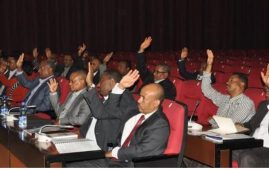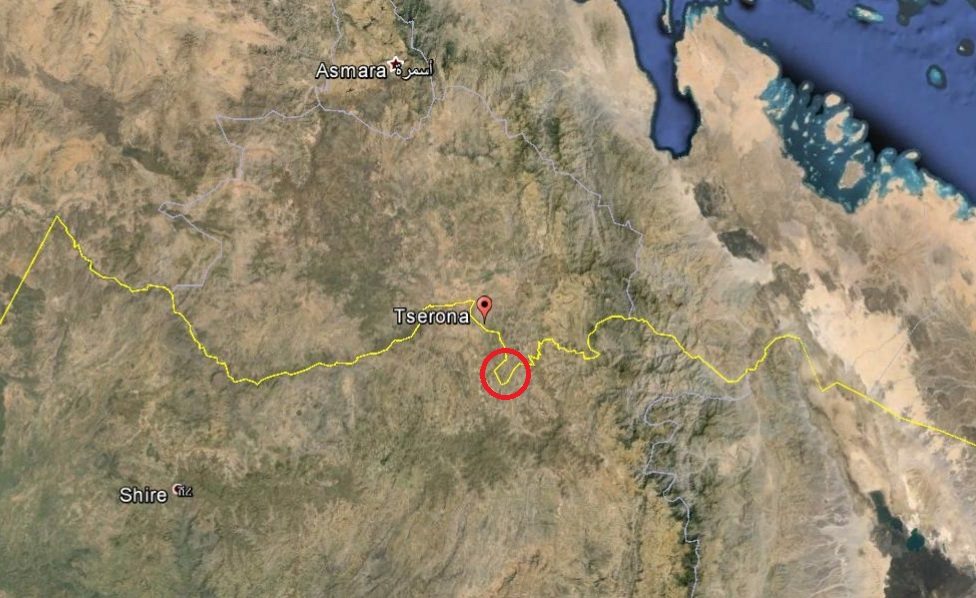Next month, Eritrea is holding an Asmara Mining Conference (October 1-5). Eritrea has a variety of mineral deposits: the Canadian company, Nevsum, has produced gold for two years at its Bisha mine, switching to copper production at the end of last year; and the Colluli Potash Deposit is currently undergoing a feasibility study by South Boulder Mines of Australia. The Conference is being hosted by the Eritrean Ministry of Mines and the Eritrean National Mining Corporation (ENAMCO), and it is billed as providing a number of presentations on Eritrea’s mining prospects as well as providing a forum for discussion.
One subject that is unlikely to be raised is the use of forced labor in the mining industry, the subject of another report last week by Human Rights Concern – Eritrea. Eritrea has no human rights organizations and HRC-Eritrea is forced to operate in exile. This report deals with the use of forced labor at the Colluli Potash Project, a joint project between Australia’s South Boulder Mines, based in Perth, and ENAMCO. Human Rights Concern – Eritrea says ENAMCO, the mining investment arm of the Eritrean government negotiates all the terms and conditions with foreign investors. It provides “no transparency or accountability and neither the Eritrean Ministry of Energy and Mines, nor the Commercial Bank of Eritrea are aware of the management of the mining resources and revenue in Eritrea. They do not know what is going on and they are not allowed to ask.” 
South Boulder Mines are currently carrying out a feasibility study of the substantial Potassium Sulfate deposits at Colluli. This is now due to be published in February next year, but South Boulder has already been highly optimistic about the prospects for the project. Colluli is about 350kms from Asmara and some 180 kms south of the port of Massawa in the south east of Eritrea. It lies in the area of the Danakil Depression, the hottest place on earth. Colluli potash deposit site is about 400 sq. km, within the Danakil depression, and its estimated expected production amounts to two million tonnes of potash per year, producing an estimated annual revenue is around up to 2 billion dollars.
The HRC-Eritrea report says that while the feasibility studies are being carried out, part of the preparation for future development is already under way, including the construction of a road from Colluli to the nearest part of the coast, which is about 70kms away. Other planned developments include the construction of a port and storage facilities as well as local infrastructure. The road, currently under construction, is being “rebuilt using the forced labour of underfed and overworked Eritreans in terrible living and working conditions.”
The report notes that the road construction is being done by Mereb Construction, a military construction company, set up by the Ministry of Defense, and run under the overall authority of the Segen Construction Company, which is owned by the country’s only political party, the Peoples Front for Democracy and Justice (PFDJ). The report claims all the workers for Mereb Construction are conscripts who are forced to work for six days per week and up to 12 hours per day, and are paid 500 Nakfa (equivalent to 10 US dollars) a month. This is the standard wage paid to all national conscripts. “They are citizens who have been held in the military against their will for many years, and treated like slaves.” Eritrea’s National Service, now the Warsai-Yikaalo Development Campaign, originally required 18 months from its members when started in 1994: six months military training and a year’s development activity. However, since 1998 when Eritrea attacked Ethiopia leading to a two year war, the Eritrea Government has never demobilized more than a handful of conscripts. The original conscripts have now been in service now for well over a decade, and more are recruited every year. This, the report underlines, is why some 4,000 Eritreans are fleeing across the borders into Sudan and Ethiopia every month.
The report underlines that Mereb Construction will also be responsible for building the accommodation at the mine and for other infrastructure, all being similarly built with its conscript labor force, in other words by forced labor. Mereb and Segen are two companies which have been frequently named as being responsible for the use of forced labor in other mining sites, notably Nevsum’s Bisha mine.
In 2009, an article by noted Eritrean academic, Gaim Kibreab, on the basis of fieldwork in Eritrea going back a decade or more earlier, concluded that the national service and the Warsai-Yikaalo Development did qualify as forced or compulsory labour as defined by relevant international conventions. The author noted that whatever the original ideas and benefits of the National Service program, the Warsai-Yikaalo Development in May 2002 turned the program into an indefinite and open-ended obligation, and concludes that “the Eritrean government ….uses forced labour as a means of political education and mobilisation, and for purposes of economic and infrastructural development, as well as for instilling work-ethic and discipline under a rigorously enforced punishment regime. It has also failed to suppress the use of forced labour by the ruling party’s firms and high-ranking officers of the armed forces… [and] in addition, the government also hires out conscripts to the private sector” All this is contrary to the international conventions to which Eritrea is a party.
He also noted that the major beneficiaries of the national service and the Warsai-Yikaalo Development were the government, the ruling party and senior army officers. He visited “construction sites where the large majority of the workers in the PFDJ construction firms were agelglot (conscripts).” In 1997–8, “Segen, the PFDJ’s construction company, built fifty-eight villas behind the Cagnew Station in Asmara. The villas were subsequently allocated to generals, high-ranking security and party officials, and selected ambassadors. Soon afterwards, about fifty additional houses were built by the same firm in the same area using conscripts’ unpaid labour, and given to high-ranking members of the armed forces…. When the asphalt road between Agordat and Tessenei was built, I was undertaking fieldwork in the area and most of the workers were conscripts. I also saw conscripts working in different ministries, departments, regional governments, agricultural schemes, digging wells, etc. The party’s firms, such as Segen, Bidho and Horn Construction, are the main property developers throughout the country, and the large majority of the manual workers, engineers, consultants, guards, cleaners, etc. are agelglot”.
More than a decade ago, former Eritrean Attorney-General, Adhanon Gebremariam, described the use of national service conscripts to provide workers for party, military and government companies, and even for individuals from these organizations, as a system of “slave labor”. He described it as a process defying “all standard international laws”. The services exacted from the conscripts, he said, had only been used for the benefit of the government, the ruling party and senior military officers, not for the benefit of the people. He noted that “the most productive section of the workforce in the country is tied up to the army and is forcibly engaged in road construction or toiling in farms belonging to army officers and the ruling party while the rest of the population are dependent upon international handouts. When such handouts [do] not arrive in time, the people [are] left with no alternative but to flee to neighboring countries.” In fact, he said, the main reason for the displacement of labor from life-sustaining economic activities to other areas was to provide for “the enrichment of the ruling party and high-ranking military officers.”
Other reports have detailed the use of conscripts in government agricultural and construction projects. A report in 2011 noted that all the big farms were owned by the PFDJ as were all the main construction companies, among whom it mentioned the major national companies, “Asbeco, Bidho, Ghedem, Rodaab and Segen and smaller ones such as Badme, Haben, Mereb, Musa Ali and Sawa.” Several reports on Nevsum’s Bisha mine identified Segen and Mereb as the major contractors, with both employing largely conscript labor. They said the overwhelming majority of Segen’s employees and labor force come from “the slave labor pool of youngsters brought from the national service and army.” Interviews of former workers provided detailed evidence of the poor treatment of Mereb’s workers and of the fact that the national service con scripts were paid no more than the then national service “salary’ of 400 Nakfa a month.
The second report of the UN Special Rapporteur for Human Rights in Eritrea, submitted to the UN Human Rights Council on May 13, focused on the country’s indefinite national service and on arbitrary arrests and detention. In its conclusion the report says firmly: “violations of human rights in Eritrea included indefinite national service; arbitrary arrests and detention, including incommunicado detention; extrajudicial killings; torture; inhumane prison conditions; infringement to freedoms of movement, expression and opinion, assembly, association and religious belief; sexual and gender-based violence; and violations of children’s rights.” The Special Rapporteur specifically labelled the endless compulsory national service as “forced labor” under the laws and norms of international law. The report says: “since the length of national service in Eritrea is of an indefinite nature, it effectively constitutes forced labor as provided for in article 8, paragraph 3 (a) of the Covenant on forced labor. The ILO Committee of Experts has also declared the practice of the National Service as incompatible with ILO Abolition of Forced Labour Convention No. 105.”
*******
Source: Ethiopian Ministry of Foreign Affairs’ weekly bulletin, Sept. 05, 2014.





